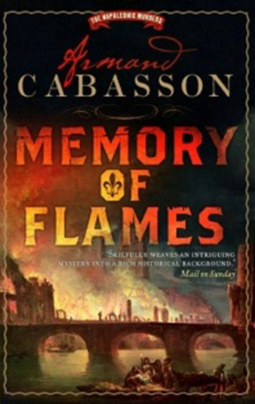
Memory of Flames
by Armand Cabasson
This title was previously available on NetGalley and is now archived.
Send NetGalley books directly to your Kindle or Kindle app
1
To read on a Kindle or Kindle app, please add kindle@netgalley.com as an approved email address to receive files in your Amazon account. Click here for step-by-step instructions.
2
Also find your Kindle email address within your Amazon account, and enter it here.
Pub Date 13 Jun 2011 | Archive Date 10 May 2016
Description
Advance Praise
Cabasson skilfully weaves an intriguing mystery into a rich historical background --Mail on Sunday
Available Editions
| EDITION | Paperback |
| ISBN | 9781906040840 |
| PRICE | £7.99 (GBP) |
Average rating from 11 members
Featured Reviews
 Reviewer 153322
Reviewer 153322
Cabasson, a French psychiatrist and Napoleon buff, sets his series hero, Lieutenant Colonel Quentin Margont, veteran of the Russian campaign and dedicated Republican, to investigating the murder of a Colnel tasked with defending Paris against the coming invasion. Margont would far rather be facing Prussians, Russians and British troops than posing as a royalist among the disaffected groups of plotters waiting for a restoration, but Joseph Bonaparte and Tallyrand have given him a direct order. Cabasson's style may be attempting the detail and rich dialogue of Hugo and Dumas, but it is very talky and and has just about the clunk of the other average historical mysteries I read.
 E V, Reviewer
E V, Reviewer
It is March 16, 1814. The Allies are closing in on Napoleon and will soon be threatening Paris. Lieutenant Colonel Quentin Margont, field officer of the National Guard of Paris, is ordered on a secret mission by Joseph Bonaparte and Talleyrand to identify and arrest the assassin of Colonel Berle who was stabbed in the heart in his Parisian home. Oddly, his face was also burnt. The Colonel was planning the defense of Paris and royalists are suspected in his murder. Margont must go undercover as a member of the Swords of the King. He must also find the Tsar’s secret agent, who is hiding in Paris, in the hope of dissolving the allied coalition. Margont solves the mystery with the help of his friends, and his open-minded, creative way of thinking.
Cabasson brilliantly enriches this mystery with historical detail in this last of three books in this series. Besides the indefatigable Margont, I was impressed by the murderer who carries poisons in small terra cotta pots to test by injecting an ox at the butchers; the royalist who escaped the guillotine during the reign of terror, after having been bayoneted by his jailers while playing dead, then thrown in a communal grave; and Margont’s boyhood memory of the tricoteuses who stuck their knitting needles in the eyes of decapitated heads at the guillotine. Although Cabasson concludes the book gracefully, I know I will greatly miss Margont and his brave companions; it saddens me.
 Leslie G, Book Trade Professional
Leslie G, Book Trade Professional
What is very persuasive ABT this title is the double talking that our protagonist has to go through in looking into what looks like a political/rebellious murder of a colonel - napoleon's brother is shown to be an incompetent, and the mixed loyalties of all make for convoluted character decisions - which leads us into a more nuanced understanding of that time period than we ever knew - great history in fact! The main protagonist does not entirely come into his own until later in the book, when he stops protesting so much! Talleyrand appears! Very ambitious and exciting stuff, with a good murder mystery at its heart (that must be hidden from the police) - we forget that Napoleon was the Hitler of his day and there were strong emotions and high stakes - these people get caught up in it almost blind-folded. The most sympathetic voice seems to be the murderer's as well: which makes us stumble to understand our own loyalties. Intriguing and smart ...
Historical murder mysteries are a hugely popular genre: what makes this series different is that the history is so detailed that the murder almost feels like it gets in the way. Cabasson knows his Napoleonic France and uses it to fine effect here.
There are times where the translation feels a bit clunky and simplistic, especially when set against the political details of the narrative - but this an excellent way of learning more about period politics in an enjoyable way.


















